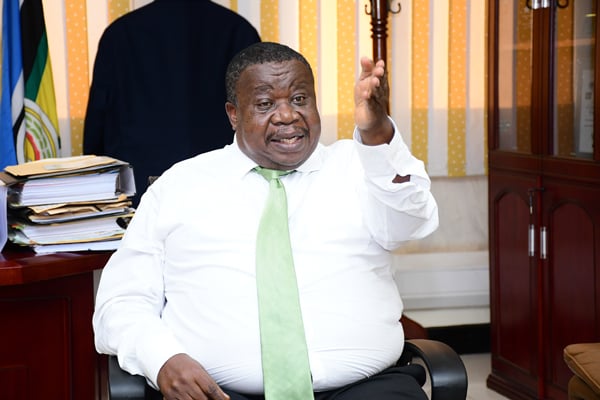Unra had become problematic, says Otafiire

Maj Gen (Rtd) Kahinda Otafiire.
What you need to know:
- The sharp rise in road construction costs has for long remained a subject of debate and suppositions, especially after President Museveni, nearly 15 years ago, delineated infrastructure development (dams, roads and railway) as his government’s main emphasis.
Internal Affairs Minister Maj Gen (Rtd) Kahinda Otafiire said the failure by the Uganda National Roads Authority (Unra) to construct long-lasting roads across the country raised a lot of “big question marks.”
Speaking yesterday at the second anniversary of the Nicole Foundation at St Mark’s Church in Entebbe, Gen Otafiire said the “cost of one road could have done two roads.”
“I am not a road engineer but I have common sense,” he said of the country’s tripling cost of constructing a road per kilometre. “If Unra cannot do roads that last longer, then we put question mark there. We question one’s patriotism,” he added.
The silver lining, he added, is that Unra is now going back to the Ministry of Works and Transport as part of the rationalisation and merger of Ministries, Departments and Agencies (MDAs).
The government conceived the merger of MDAs to check on the bloated inefficient bureaucracy and save at least Shs1trillion annually in expenditure.
“We have had a lot of problems with Unra,” Gen Otafiire said, inferring that the exorbitant costs of road works are driven by corruption. “Why don’t people cut down on their personal needs so that Ugandans have good roads?” he wondered.
The sharp rise in road construction costs has for long remained a subject of debate and suppositions, especially after President Museveni, nearly 15 years ago, delineated infrastructure development (dams, roads and railway) as his government’s main emphasis.
Unra, which was born in 2008 with a specific mandate of developing and maintaining the national road network and advising on general roads policy, routinely attributes the obscene costs to the road designs, laborious land acquisition process, and delays on the government side to fulfil its contractual obligations which eats up in the contract prices.
Experts, however, say the heavy kickbacks--commonly referred to as cost of facilitating business--paid across the chain to secure road construction tenders is complementary in driving the costs up. The unit cost per kilometre on average, in Uganda costs between $750,000 (Shs2.5b) and $1m (Shs3.5b) while the same in Kenya goes for $300,000 (Shs1b) and $330,000 (Shs1.1b) in Rwanda
Maj Otafiire further called for tougher measures to be put in place to check on the “upside down mentality” exhibited by drivers on the roads, which results in nearly 3,000 fatalities annually, according to the last published police crime report.
“There is a lot of foolishness on the road. Let’s look for stiff measures to deter these crashes. But of course when you die, there is no stiffer punishment than death. People need to learn that you are driving a machine; it is not your relative. A machine does what you tell it to do; if you die alone, that is okay, but unfortunately there is usually a lot of innocent lives involved,” he said.
Road carnage costs the country at least Shs4.4trillion annually, according to a 2018 International Road Assessment Programme study. The country, the study showed, loses Shs215m for every fatality and Shs53m for every serious injury.
The Nicole Foundation is a road safety not-for profit, started in memory of the late Nicole Ahumuza, who died in a car accident in January 2020 in Kasese District. She was daughter to Mr Ernest Rubondo, the executive director of the Petroleum Authority of Uganda, the oil sector regulator.
The foundation advocates for road safety through advocacy campaigns, including mapping out of all blackspots on all major roads.




